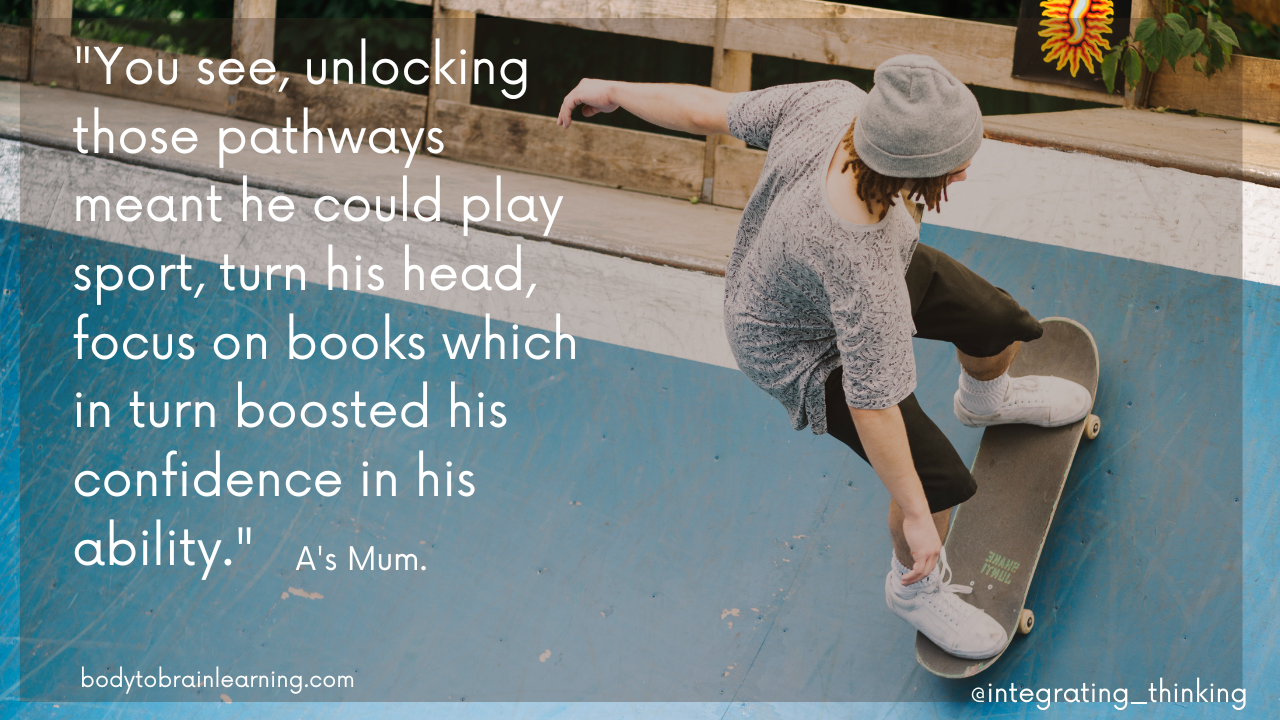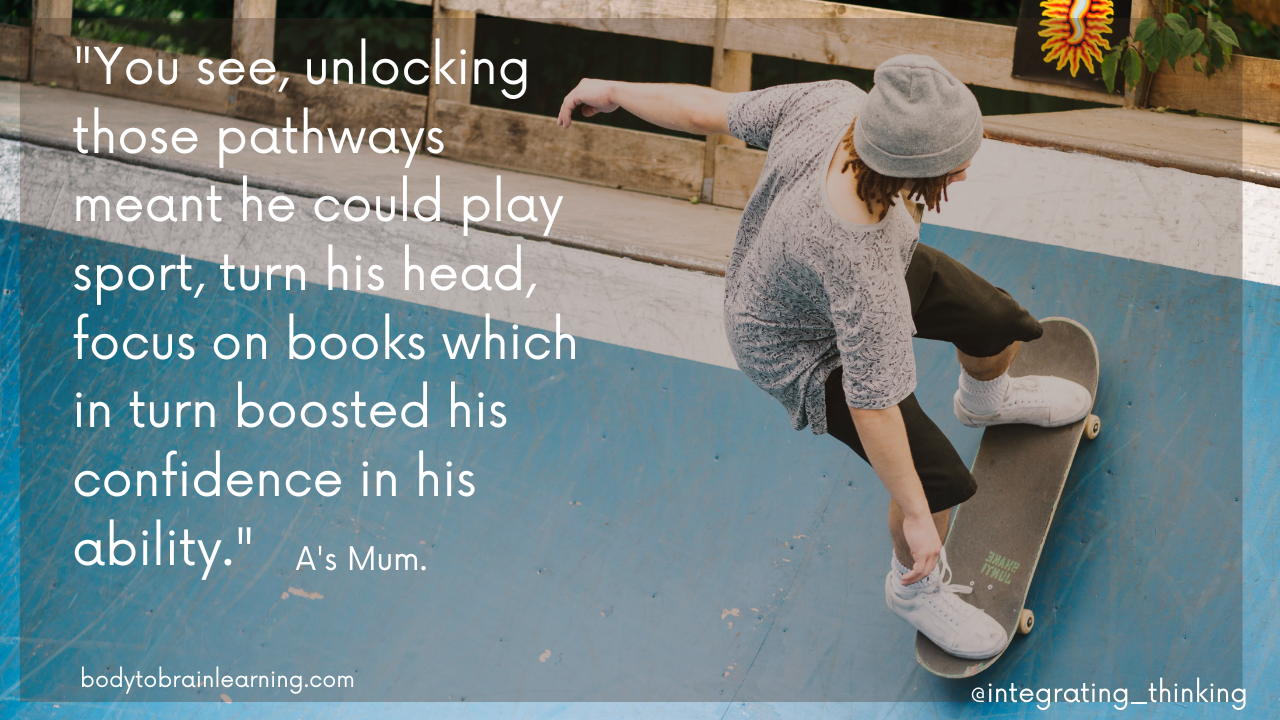A's Story: “That's not who I am or how I see myself!"
Oct 11, 2022
 In my work, I get to see many children, help them and their families, and then they move on. It’s a privilege and heartening to see them improve and to witness the family’s relief as their child’s function improves, and the child’s participation in learning contexts improves.
In my work, I get to see many children, help them and their families, and then they move on. It’s a privilege and heartening to see them improve and to witness the family’s relief as their child’s function improves, and the child’s participation in learning contexts improves.
I often wonder what happens to those children down the track and think about how they are going. I know with some children my work is just one part of the complex puzzle they face. For others, it can be the missing piece and the last therapeutic piece for their puzzle that sets that child up for better function and success in their learning and educational environments. It’s a bit of a mixed bag.
This week I received a message from A’s Mum. I saw A when he was about 6 – 7 years old (early Primary school). He’s now in Grade 9. A’s mum brought me up to date on his learning journey and story so far.
I thought about editing this and using snippets of the story, but, with A’s Mum’s permission, I’ve decided to print the whole lot because it is real, authentic and shows a bit more about the educational experience of some (in fact quite a few) of the children with whom we work. It provides a bit of a longitudinal perspective and shows that it’s the child in the education system that needs to be the focus of our work because they are complex beings. Supporting that child is an ongoing process.
Hi Christine.
I saw your post and thought I'd message you…
I wanted to say that A is now in grade 9. When he started high school his anxiety increased, his grades plummeted and he was struggling with starting high school, learning online and knew no one. We gave it until the end of grade 7 and after 10 months of regular psych sessions we decided to test him for ADHD. He is much better and understands his own brain now.
But I wanted to say that those times we came and saw you, I believe that's what got him through primary school without meds. High school is not set up for children with poor executive function. But I'm proud that all the therapies we did, meant he could function throughout primary school.
You unlocked all those gross and fine motor skills and got his left and right sides talking. He's an amazing skateboarder and a strong rugby player. And I see so many boys his age with low muscle tone and generally floppy and I'm so relieved and grateful that you helped build a strong neuro-physical and psychological pathway for him.
The thing that made me realise it was probably time to consider medication was hearing him explain to the paediatrician how he'd get anxious before a class he knew he'd need to concentrate in and that he'd be worried he'd call out = be classed as the naughty kid "cause that's not who I am or how I see myself" = going to the detention room = mum and dad finding out = people not liking me = I won't have friends.
After hearing all of that and the stress for him having to remember a pen, but forgetting, and the conversation with the teacher about being responsible for his belongings and feeling as though at every turn he was failing. We realised if we didn't consider meds, he'd end up with low self-esteem and poor choices and poor impulse control.
Evidently his diagnosis has enabled him to accept what works and what doesn't. I truly believe addressing the underlying physical issues provided a solid foundation for him. A’s Dad and I have often thought how differently his ADHD would have developed had we not addressed those pathways. I feel like now all we're dealing with is getting him through the education system.
See, unlocking those pathways meant he could play sport, turn his head, focus on books which in turn boosted his confidence in his ability. Which meant when high school started and it was hard, he knew (and so did we), it was the system, and in order to get him through, we had to take steps.
There's a pic to show you how everything works together. [She inserted a picture of A skateboarding confidently]. And it all feeds into itself. More confidence. Improves core, balance etc. which benefits other aspects of his life.
I think the therapy we had with you unlocked a lot of things so we could determine what would be needed long term e.g. what are we left with? Which ultimately was the executive function in the context of school.
His ADHD is a delight for the most part.
And, it unlocked a lot of things for his Dad too. (And maybe even me!).
Take care Christine.
A's Mum.

Why do I love this story so much and why does it give me goosebumps?
Let me explain...
Yes! It makes me feel good that I have helped steer A’s Mum in supporting and developing his immature neurophysiological and neuromotor systems (she did the work, and I helped with assessments and suggestions). Yes, there were good results for A that enabled him to move from a floppy, inattentive, struggling young boy to become a proficient skateboarder and rugby player who is confident in his own skin and knows where his body starts and stops so that he can play a contact sport and skilfully control a skateboard. Yes, he navigated Primary School and was able to participate in that context successfully.
Mainly, though, I love this story because it shows that A’s learning story isn’t "magically cured” with our therapy. It is one part of the complex and unique person who is A, and his parents realise it isn’t a “quick fix” scenario.
Our work and therapy matured the lower parts of his brain function which enabled him to participate well in primary school. There are other challenges for A that are “executive functioning challenges”, and he needs continued support with that, but the process chosen by A’s parents was a neurodevelopmental process that followed the developmental sequence. It gave a window and foundational basis for him to function well until he was really challenged by the system and the complexities of High School. It’s a long-term developmental perspective and approach that gave A’s brain time to develop. A’s parents didn’t jump to executive function support before they worked through the neuromotor and sensory immaturity that he faced. They weren’t “fixing” A. They were, and continue to, support A with his function and abilities where he is at, at the time.
It’s a journey and not always a ‘quick fix’ for some of our clients. A’s ongoing story, discovery and formal diagnosis of ADHD and the management plan for him at the moment is primarily there to help him continue to navigate the system successfully. It allows him to receive the benefits of that system because it has opened the door to enable him to access it without the anxiety and associated dilemmas of struggling with organising his body and his brain to work together so he can deal with his school situation. He can trust his brain and body and, as a result, function more effectively.
As an aside, A’s story so far also highlights the complexity and expectations of our school systems that assume levels of function and capacity without noticing what that may take for some children. Our school systems and curriculum make numerous assumptions about students’ physiological and neurophysiological capacity. And that’s often where our school systems often fail our children.
We now know about these aspects of brain and body function and how they support, or interfere, with the learning process. More and more children are being identified with neurodivergent presentations. Our teachers are at the forefront of working with this situation and new knowledge. However, our teaching staff and educational systems are struggling to catch up with the research, and information. Our teachers are struggling to respond effectively to this growing awareness and need for learning support. They feel ill-equipped to make the appropriate adjustments required, largely because they don’t fully understand how we learn to learn, how to identify how students use their bodies to support their learning, and how to support the function of the brain and body of the students in front of them. Perhaps that’s the topic for another discussion/chapter!
Back to A and his learning journey…
A clearly states he “doesn’t want to be the naughty one.” That’s not who he is. But he was nervous about his control of his body and his responses. He now understands his brain and function better because his parents recognised the importance of the neurodevelopmental process and his way of working and they supported that from an early stage.
They haven’t “fixed” him. Rather, they’ve supported him and his body systems to enable him to participate more effectively in his world. They have supported his brain’s maturational process and where he is in that journey and process. It hasn’t been a quick “fix” because A wasn’t broken. He just needed support.
This is why I do what I do. This is why this work is so important.
That’s worth so much.
Understanding and applying the Body to Brain Learning™ process helps students and teachers attain better academic learning outcomes. It's a neurodevelopmental approach that impacts the well-being of students and teachers at school and can help support neurodivergent students and those who work with them. It also assists those who are underachieving academically and are experiencing learning challenges because of neuromotor and sensory immaturity.
LEARN MORE and STAY INFORMED
If you would like to learn more about the Body to Brain Learning™ process and join in the conversation, then sign up for regular updates, training information and other 'neuro-nerd' learning discussions using the button in the section below.
You can also follow us on Facebook, Instagram and Linked In. Please join in the conversation there. Body to Brain Learning™ is part of Integrating Thinking Neurodevelopmental Education Consultancy.
Dr Christine Payard (PhD) is a Neurodevelopmental Educator, founder of the "Body to Brain Learning™ Professional Development Series", Director of "Integrating Thinking" and the INPP Australia Principal.
She is an experienced teacher, presenter, and passionate educator who could talk all day about learning, how we learn, the body, the brain, and a functional and developmental approach to learning.
Learn more:
www.bodytobrainlearning.com www.integratingthinking.com.au www.inppaustralia.com.au
Stay connected with news and updates!
Join our "Integrating Thinking" and "Body to Brain Learning" mailing list to receive the latest news, updates & training information from us.
Don't worry, your information will not be shared with others.
We HATE spam, so you won't be inundated with emails from us.


